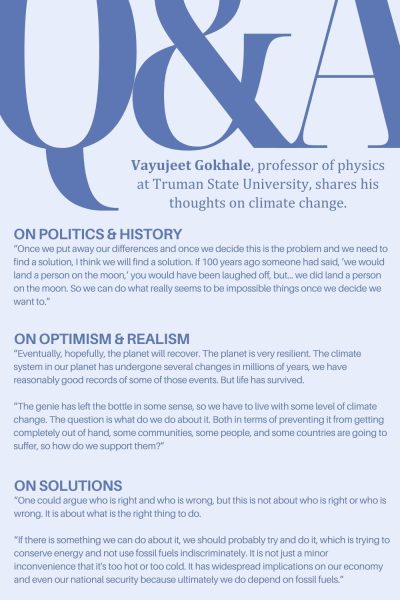Half of the country is projected to experience higher than normal temperatures for the season this week, with most of Missouri, including the St. Louis area, leaning above average, according to the National Weather Service’s Climate Prediction Center.
This weather trend concerns people like Avery Wichman, senior, who said climate change is affecting people at home and abroad.
“I have gotten heat exhaustion just walking from my house to somewhere else, just on those very very hot days, those 100 degree days,” Wichman said.
And more recently, according to Florida State’s Climate Center, Florida is in the peak of the Atlantic Hurricane season, and will last to the end of November.
“I am very concerned about the family down in Florida and all the hurricanes they are experiencing because they are having a lot of issues there and some of my relatives, my older relatives, are worried about their houses and having to evacuate,” Wichman said.
Hurricanes will only continue to cause more flooding as sea levels rise and be even more violent than they have been previously, according to Florida State University.
Students aren’t the only ones concerned about climate change, however. Kevin Koch, AP Environmental Science teacher, and experts have also noticed changes in the climate.
“We are still seeing very high temperatures of the ocean because they are absorbing heat from the atmosphere, but yet we are moving into an el niño where we shouldn’t see frequency of hurricanes and strength of hurricanes,” Koch said.
Koch said the warming ocean causes the atmosphere to hold more water vapor and energy, so the strength of the storms are increasing, but not necessarily the frequency.
In regards to the heat, Koch said there have been heatwaves in the past, but not as extensive and frequent.
“It is fairly rare, but when they start becoming frequent, that’s when we look at what is causing this: is this due to climate change, is this a rare event, is this an anomaly,” Koch said.
Koch said in the future he expects more droughts and heat waves and storms of greater intensity.
“With these storms comes heavier rainfall, heavier rainfall leads to more runoff, which leads to more flooding events,” Koch said. “The St. Louis area right now, there are several low lying developed areas that are now really being influenced by flooding when they hadn’t been before.”

Robin Verble, director of the environmental science program at Missouri S&T, also has noticed a trend of increased extreme weather events and climate change in Missouri.
“Over the last 30 years we have noticed an increase in hot summers, so summers, on average, tend to be warmer,” Verble said.
The warming of Missouri summers and the globe can be attributed to increased carbon in the atmosphere due to industrial pollutants and human activities, she said, and this warming will cause more extreme weather.
“What that means for us is more extreme hot days in the summer, and it might also mean more extreme cold days in the winter, and it means that our precipitation tends to fall in more extreme events,” Verble said.
Verble said extreme heat due to climate change will affect many people in the St. Louis area in a variety of ways.
“With more extreme heat days you are going to get issues with air quality, so you may have
people who are respiratory compromised, or have breathing problems having more issues with things like asthma or COPD or emphysema,” Verble said.
People who do not have access to reliable air conditioning or struggle to pay utility bills will be negatively impacted by hotter summers, Verble said.
“Increased heat has a lot of effects mostly on underserved and disenfranchised populations,” Verble said.
Chris Freund, director of facilities services, said the efficiency of heating, ventilation and air conditioning systems (HVAC) is a factor when renovating and building new buildings in the district.
“Rockwood recently partnered with a company to help us recommission the automated systems that control our HVAC equipment,” Freund said. “The annual energy cost savings were $47,627 for a total of $99,047 to date, a pretty good return on investment.”
Freund said as a part of the recommissioning program, HVAC systems have been modified for more than 20 years to be more efficient by taking advantage of free cooling.
“More efficient HVAC equipment, automated control systems, higher efficiency lighting, more efficient cleaning equipment, green cleaning supplies, low VOC paints, adding more environmental awareness in the curriculum,” Freund said. “These are just a few of the things we have done to be more responsible for our taxpayers and the environment.“
This story was originally published on Marquette Messenger on October 18, 2023.




































